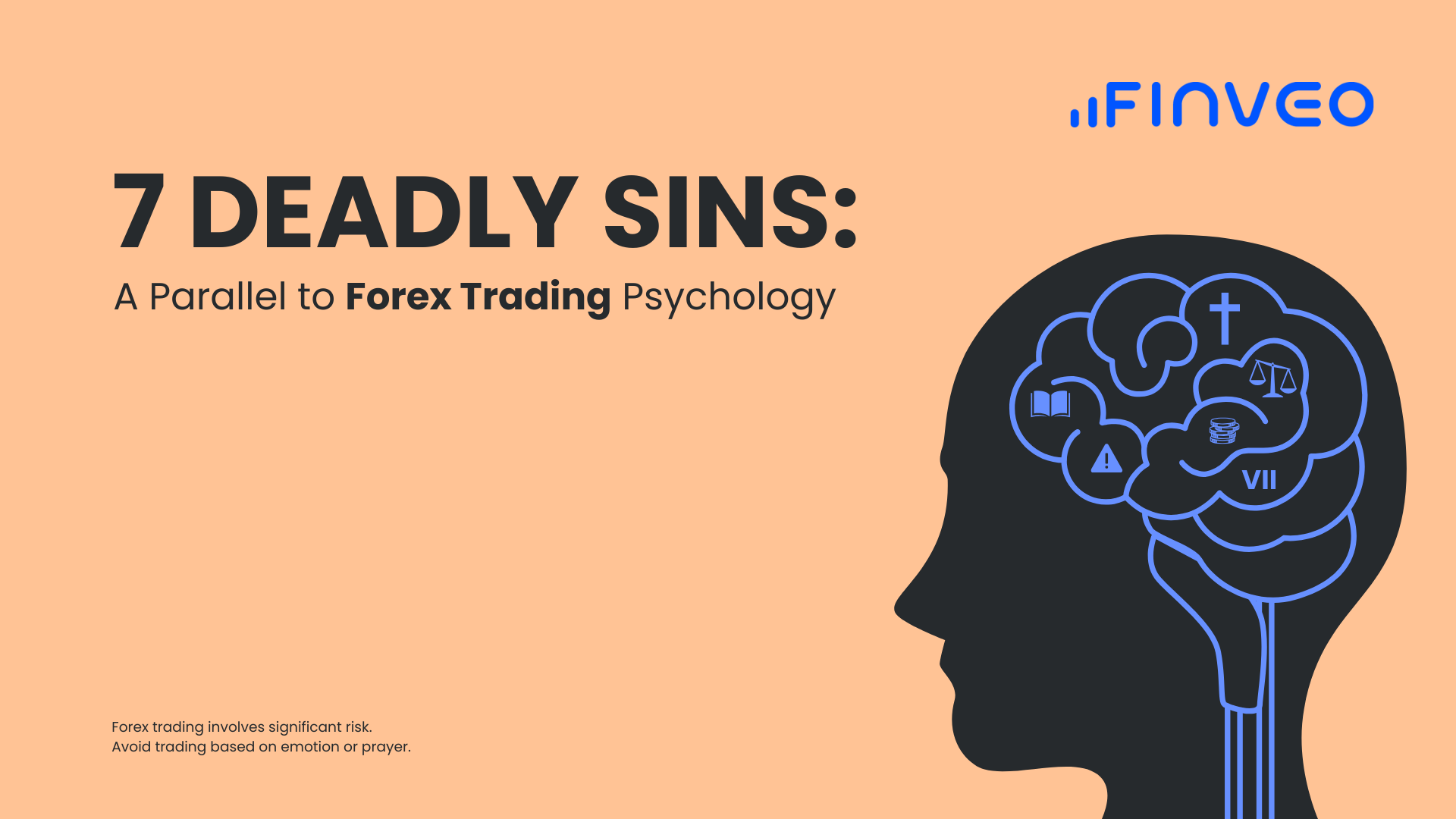
7 Deadly Sins: A Parallel to Forex Trading Psychology
Forex trading isn’t just about numbers and charts. It’s about managing your emotions and your mindset. While religion and investing are totally different realms, there’s something interesting when you look at them side by side, both come down to behavior and psychology. Just like the seven deadly sins are meant to guide you away from destructive behavior, they can also be interpreted in trading context. Recognizing these “sins” can help you avoid falling into psychological traps that might hurt your trading journey. Let’s have a look at how each of these sins might affect your approach to trading. The seven deadly sins -pride, greed, lust, envy, gluttony, wrath, and sloth- are seen as moral pitfalls. They represent the negative human tendencies that can lead us astray. While they have their roots in religion, their psychological effects are universal, and they can be applied to all sorts of areas in life, just like trading. It’s fascinating how these timeless principles still hold up in today’s world.
The 7 Deadly Sins:
Pride
Ever felt like you had the market all figured out after a couple of successful trades? That’s pride sneaking in. Pride in trading can lead to overconfidence, making you believe you’re invincible. But here’s the thing: the market is unpredictable. Thinking you’ve mastered it after a few wins can lead to reckless decisions, like increasing your positions or ignoring your risk management plan. The best traders stay humble and always keep learning, no matter how many wins they rack up.
Greed
Greed is one of the biggest dangers in Forex trading. It’s the feeling that you just have to have more! More profit, more trades, more everything… Greed pushes you to take bigger risks than you should. Maybe you start ignoring stop-loss orders or overleverage your position, thinking you can handle it. But here's the reality: sustainable success in trading doesn’t come from hitting it big every time. It comes from sticking to your plan and keeping your risk in check. Slow and steady wins the race.
Lust
Lust in trading isn’t about desire for someone, it’s about impatience. Some traders feel the need to always be in the market, whether it’s the right time. Overtrading is a classic sign of lust for action. It’s when you’re constantly itching to make a move, even if the market doesn’t look right. Trading is all about timing, and sometimes the best move is no move at all. The most successful traders know when to wait for the right opportunities and when to stay out of the market.
Envy
Envy can creep in when you start comparing your results to others. Maybe your friend is posting about a big win, or you see a trader online who seems to have it all figured out. Suddenly, you feel the pressure to catch up, make a similar trade, or take unnecessary risks. But here's the truth: every trader has their own journey. Comparing yourself to others will only distract you from what matters, which is your own strategy. Stay focused on your goals, and trust that your consistent approach will pay off over time.
Gluttony
Gluttony in trading is all about overindulgence. It’s when you’re taking more trades than you really need to, driven by that constant craving for more profit. But here’s the thing: overtrading just increases your risk. It’s easy to get caught up in the excitement of making money, but you must know when enough is enough. The best traders don’t rush. They know that trading is a marathon, not a sprint. Stick to quality trades and avoid trading just for the thrill of it.
Wrath
Wrath in trading usually happens after a loss. You know that feeling when you get angry or frustrated and want to get back at the market. This is when revenge trading happens, and it’s one of the quickest ways to spiral. Letting your anger guide your trading decisions will only lead to more losses. Remember, every trader faces setbacks. The key is to stay calm, stick to your strategy, and learn from your mistakes. Don’t trade out of anger, use the experience to grow and improve.
Sloth
Sloth in Forex trading is about laziness. It’s when you stop putting in the effort whether that’s skipping your research, ignoring market conditions, or failing to review your past trades. Trading requires active engagement. Complacency or laziness can cause you to miss important opportunities. Stay engaged, keep learning, and stay on top of your game. Don’t let sloth sneak into your trading routine.
Conclusion
Forex trading is a mental game just as much as it is a numbers game. Recognizing the psychological traps related to the seven deadly sins can be a powerful tool in improving your approach to the market. The key to long term success isn’t found in chasing big profits or reacting emotionally. It’s in staying disciplined, understanding your emotions, and executing a well thought out strategy.
Forex trading involves significant risk. To manage risk smartly, ensure that you stay informed, use the right tools, always conduct thorough research and avoid trading based on emotion or prayer. Risk management is essential and having the right tools in place like stop-loss orders, position sizing strategies, and risk-reward calculations can help protect your capital and keep you on track. Trading with a clear head and a well-researched strategy is what separates successful traders from those who get lost in the psychological traps. If you're ready to start trading with a platform that emphasizes transparency, the importance of risk management, and offers fast support in case you need it, Finveo is always here for you. Join us now!